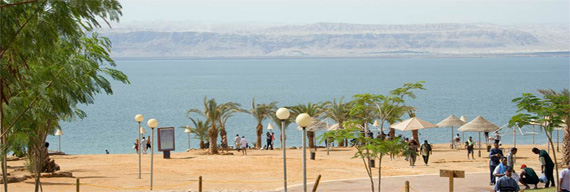|
Dead Sea is the lowest point in the world
at 394.6 m (1269 ft) below sea level. It borders Israel, the West Bank
and Jordan. Currently, 25 km of Dead Sea
coastline lie within Palestinian Authority territory, including Qumran
and Ein Feshka.
Dead Sea name is derived from the fact that
the water is far too
salinated for marine inhabitation. The water is extremely salty, and
has been estimated to be the second saltiest major body of water in the
world.
The Dead Sea is naturally endorheic (no
outlet streams) with the Jordan
River being its only major source. The northern part of the Dead Sea
receives scarcely 100 mm (4 inches) of rain a year; the southern
section receives barely 50 mm (2 inches). Due to the man-made reduction
of the Jordan River (the river waters are 70-90 % used for human
purposes) and the high evaporation rate of the Dead Sea, the sea is
shrinking. All the shallow waters of the southern end of the sea have
been drained and are now salt flats.
Although the Dead Sea would never entirely
disappear (because
evaporation slows down as surface area decreases and saltiness
increases), measures are currently being proposed to siphon water from
the Red Sea through a series of tunnels or canals in order to
replentish the rapidly shrinking waters and provide water and
electrical solutions to the surrounding countries.
The climate at the Dead Sea varies depending
on the season.
Temperatures during the tourist season can become extremely warm,
ranging from 30°C (86°F) in the spring to upwards of 40°C
(104°F) in
the summer. The area receives an average of 330 days of sunshine per
year, with rainy days occurring only during winter (if at all).
Although the Dead Sea is very sunny the low
altitude and extra
atmosphere makes the sunlight weaker. It is therefore said that
sunbathing here carries a lower risk of sunburn, but it is still
advisable to take normal precautions using sunblock and adapt
gradually. This quality of the Dead Sea sunlight is the real secret
behind its mythological curing ability for several diseases, especially
skin diseases. This is, in fact, natural phototherapy.
Due to the hypersalination of the water, one
can float with ease in the
Dead Sea; in fact, it's nearly impossible to sink! A popular fad by
visitors is to have their picture taken while reading a newspaper and
floating on the surface of the water.
The mud along the shore of the Dead Sea
contains many minerals and is
believe to have medicinal and therapeutic benefits. It is not uncommon
for visitors to cover their bodies with the dark mud.
Visitors can purchase packets of the famous
mud, as well as other
cultural artifacts and handicrafts, from local gift shops. The Israeli
side is home to the world famous Minerals Dead Sea Products.
There are many salt deposits and crystals
scattered along the
shoreline. Many visitors walk the beach in search of large pieces as
souvenirs.
Related Links:
 Dead
Sea From Israel & West Bank Side Dead
Sea From Israel & West Bank Side
 Dead
Sea From Jordan Side Dead
Sea From Jordan Side
 Asia
Parks Asia
Parks
 Travel
Asia Travel
Asia
|













